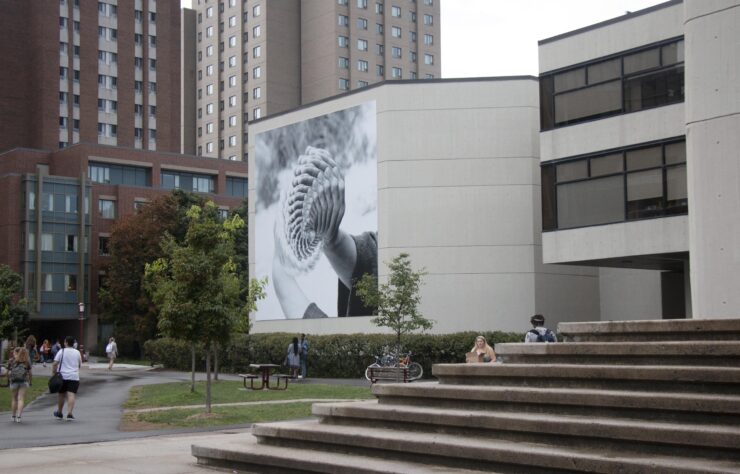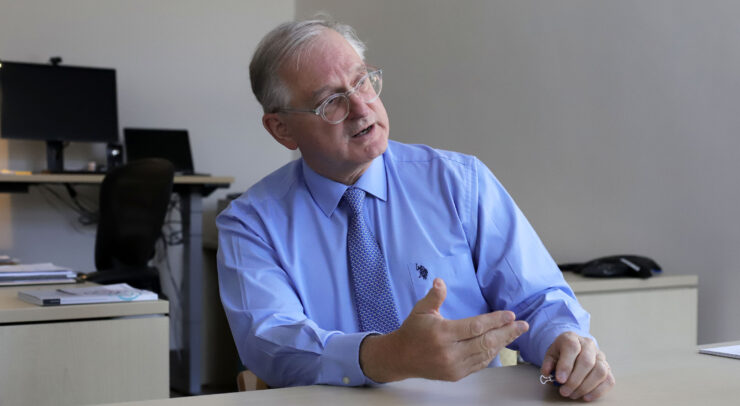Where likes, retweets, comments and follows intersect with mental health
People have never been less alone than they are right now. But that doesn’t mean they’re not lonely.
“It’s a scary world,” says Lynne McInally, a clinical social worker, therapist and instructor at Humber College. “I’m just thankful to not have been a teenager in the world of the iPhone.”
From Facebook and Twitter to Instagram, Snapchat and beyond, the arrival of social media revolutionized the way people interact. It’s never been easier to communicate with someone, but does constant connection correlate to better connection? This is a question that has the potential to impact every level of socialization, and one that’s at the forefront of current psychological research.
Melissa Murray is a fifth-year commerce student who serves as vice-president finance of the uOttawa Mental Health Awareness Society (UOMHAS), an on-campus organization that spreads awareness, offers support and works to reduce the stigma surrounding mental health at the University of Ottawa. Murray says she thinks social media has the potential to be a great resource to connect people dealing with mental illness to build support networks.
“It provides a platform like no other for instant dialogue and conversation … a platform for people to express themselves openly and freely, and in turn, connect with others,” says Murray.
She cites the UOMHAS’s buddy program that matches student participants with one another through Facebook as a realization of social media’s potential to connect.
But for experts, social media is undoubtedly a double-sided coin, and one of the biggest concerns mental health professionals have with social media is its impact on self-confidence. Social media is marketed as a platform that increases human connectivity, but in reality, it often magnifies and accentuates the sources of insecurity, McInally says.
Anxiety isn’t a new phenomenon — people have always struggled to cope with not being invited to events, seeing their ex-partner with someone new, or watching people buy all the things they can’t afford — it just used to be a lot more avoidable.
With the emergence of social media, the sources of natural human insecurity are constant and instantaneous, and just a click away. For this reason, among others, research has found that there is a direct correlation between widespread social media usage and increased depression and anxiety.
One recent study, published in the Journal of Social and Clinical Psychology in 2018, asked about 140 undergraduate students at the University of Pennsylvania to either choose to continue their regular use of Facebook, Snapchat and Instagram or to spend only 10 minutes on each per day for a three-week period. The students were also asked to fill out questionnaires on their mental health, looking specifically into anxiety, depression, loneliness, and ‘fear of missing out.’
The study found students who limited their social media use “showed significant reductions in loneliness and depression … compared to the control group,” while “both groups showed significant decreases in anxiety and fear of missing out … suggesting a benefit of increased self-monitoring.”
Another study from York University, published in the Body Image journal earlier this month, looked into the ways social media impacts body image in young women.
The researchers asked half of the close to 120 female undergraduate students in the study to select a peer on Instagram or Facebook they found attractive and to comment on one of their posts, while the other half selected a family member they felt was less attractive and did the same.
The study found the former group experienced increased negative body image, suggesting “upward appearance comparisons on social media may promote increased body image concerns in young adult women.”
“A measuring stick no one can ever live up to”
“When you have a thought, or a belief system, or a feeling about yourself, how do you measure it?” asks McInally. “You compare it to something. So if you’re spending most of your time on social media, you’re comparing yourself, both mentally and physically, to a measuring stick no one can ever live up to. What does that do to people?”
“Whenever I buy something new or go somewhere cool, I post about it,” says Lindsey Hatch, an electronics engineering student at Humber College. “You want to project the best possible image of your life online.”
“I think it’s helpful for us to reflect on our social media use to understand the impact it can have on our mental health,” adds Murray. “We put on filters, both literally and figuratively. With this in mind, I think it can become easy to fall into a trap of over-stimulation and becoming obsessive about looking and acting like others and ultimately can become detrimental to our self-esteem.”
Tina Wang, a second-year political science student at the University of Ottawa, recently deleted Instagram and Snapchat to escape from the negative impact of social media on her mental health.
“I was chronically scrolling and refreshing my feed, and at some point, I realized that it was always the same people posting the same things and it really wasn’t that interesting,” she said. “I found myself judging people who always posted, but I realized I wasn’t any better, sitting there watching their stories. I didn’t find it a very meaningful way to spend my time.”
“As much as it’s a positive platform, social media can also bombard us with post after post of unrealistic societal and beauty standards or upsetting world news,” agrees Murray. “Personally, I take breaks from social media intermittently.”
“I feel like constantly looking at a screen really disconnects you from what is going on around you in the real world,” Wang says. “It disconnects you from what’s fake and what’s reality.”
“I feel that social media has become an avenue to hide,” adds McInally. “As much as social media’s open and you’re so expressive through images and words, you lose the skill base of how to actually socially interact, face-to-face and human-to-human.”
Constant connection, constructed memories
As key as socialization is to mental health, another important component of a strong psyche is an ability to be alone. Coping with and actually embracing boredom and moments of stillness allows rare opportunities for personal introspection, which promotes a healthy understanding of self, McInally says.
“Being off social media gave me a lot of free time,” Wang says. “It was weird because I would be waiting for my coffee at a coffee shop and everyone else was on social media, so I found myself observing things around me.”
“It’s a skill to slow down,” McInally says. “I feel that social media has sped things up so quickly for this next generation that it’s no longer natural but has now become a behaviour that must be learned, to slow down, disconnect, and be present in the moment.”
Although the current impact of social media on mental health is certainly troubling enough as is, many mental health workers, including McInally, are looking towards the future with concern. The fear is that since the images we share on social media are so heavily curated, we will not feel a strong emotional connection to the memories associated with them. The implications this has for a healthy perception of self are troubling.
“I saw teenagers on the beach behaving one way, taking a photo, and then going back to their old behaviour, and I thought, ‘oh my God, you just captured a moment that wasn’t real,’ McInally says. “I wonder what it will be like for this generation and it scares me, to think about when they’re 40 and 50 and they’re pulling out photos of their past. How real are they going to be?”
“There have definitely been moments in my life where I’ve caught myself recording something instead of just experiencing it,” says Hatch. “Or times when I find myself looking at a picture where everyone is smiling and thinking, ‘Oh, I remember that party sucked.’ But from the outside looking in, it doesn’t look that way.”
The importance of memory — of sharing and reflecting upon them with friends and family and feeling connections to them through that experience — is an important part of how we ground ourselves in our identities. Until this generation ages, there’s no way to tell how the culture of selfies and social media will impact the collective ability to reminisce.
A double-edged sword
The widespread concerns presented by social media have some professionals calling for its abandonment, but the realism of that plea is dubious. There are, however, a number of solutions to the problems that social media presents that don’t run from the digital realm, but rather embrace it.
“We are not going to get away from this movement,” says McInally. “The world is going to continue to use social media. We’re not going to get rid of it. So now, how do we add on more resources to support the process of helping alleviate these mental illnesses?”
Digital resource development targeted at relieving mental illness has become a booming field in technology, giving rise to a wide range of services, from mindfulness and meditation apps to yoga and YouTubers to crisis lines that are reachable by text. The Internet also increases accessibility to a wide variety of services, such as walk-in therapy, local counsellors, or classes on critical reflective practice.
Wang says she found that in the absence of Instagram, she discovered new and better ways to unwind through technology, including meditation app Headspace and a Spotify podcast called “Nothing much happens; bedtime stories for grown-ups.”
The digital world has transformed discourse on a wide variety of topics as well, and nearly every part of human life has been altered by digitization. Perhaps the most pressing issue is whether or not this revolution has affected the very ability to be human — to connect, to reflect, and to think independently.
If so, there is sure to be extensive discussion as to how we can best use the tools at hand to protect human sensibility from the harshness of the online world, and create a digital environment conducive to a healthy mind.
“The Bell Let’s Talk initiative comes to mind first as a positive and productive use of social media for mental health awareness and ultimately creating discussions on misconceptions about mental illness,” says Murray. “Social media (can give) people a place to go to reach out for help.”
Murray also adds that here on campus, perhaps more can be done to alleviate the burden of mental illness.
“From my experience and from what I have heard of others’ experiences, accessibility can be improved because these service providers are overwhelmed,” she says. “I think there’s potential for the university to put more resources in more proactive, preventative measures as opposed to reactive measures.”
Murray explains that the triggers and stresses that are driving the high demand for mental health resources should be explored and, where possible, resolved.
“I don’t have the answers, but I think that’s the next best step in terms of improving the quality of students’ experience with mental health services and resources on campus.”
As of right now, McInally says she thinks the future of mental health in the virtual world lies with app developers and online web pages, like the ones listed above.
“Who’s going to challenge social media? Nobody. The only way we can challenge it is to bring in these apps and services that are going to support mental health.”





